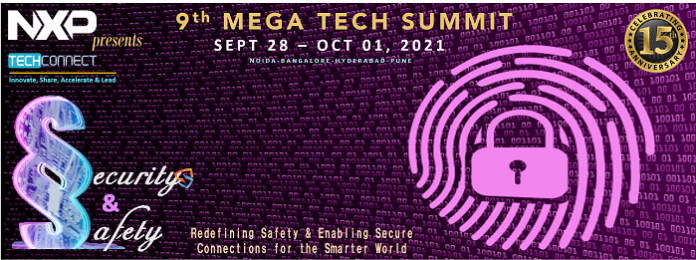NXP India one of the biggest R&D Centres for NXP Semiconductors, a world leader in secure connectivity solutions for embedded applications organized their 9th Mega-Tech Summit- Security & Safety Week. With the theme ‘Are Safety and Security a source of competitive advantage for next-generation products’ the virtually held event shed light on how in the hyper-connected and constantly evolving Indian automotive sector, safety, and security technologies should be given due importance.
Cybersecurity and functional safety, multilevel stakeholder collaboration & engagement, and sparking innovation through incentives, were identified as the pathway to an indigenous automotive ecosystem.
The four-day-long virtual event comprised of multiple engaging keynotes by NXP Global leaders starting with Rafael Sotomayor, Executive Vice President & General Manager, Connectivity & Security, Henri Ardevol, Executive Vice President & General Manager, Automotive Processing, Lars Reger, Executive Vice President & Chief Technology Officer and Steve Owen, Executive Vice President, Sales, and Marketing.
The four-day Summit comprised of much-awaited Industry Panel Discussion which broached the pressing need of cybersecurity and functional safety for automotive and steps that should be taken in a fast-digitalizing automotive sector. The panel discussion comprised of distinguished leaders from industry, government, and academia who shared insights on the dire necessity of instituting robust security mechanisms, creating public awareness, keeping pace with tech advancements, being ahead in the race against unethical programmers and malicious hackers, and above all, a cooperative ecosystem to foster innovation. The panel was honored by Lars Regar, Executive Vice President and Chief Technology Officer, NXP Semiconductors, Dr. KR Murali Mohan, Mission Director, Department of Science & Technology, Government of India, Dr. Manan Suri, Associate Professor, NVM, and Neuromorphic Hardware Research Group, IIT Delhi, Satish Sundaresan, Managing Director, Electrobit India, and Mohan Krishna Raj, VP & Global Head, UX Heuman Design, Harman International.
Sanjay Gupta, Vice President, and India Managing Director, NXP Semiconductors, who moderated the panel discussion said, “Collaboration is the key to a secure & connected future. At NXP, we are working with academia, start-ups, and government to boost the ecosystem to be able to cater to create a vibrant ecosystem in the country and proactively address the most important technology challenges”.
The panel highlighted that the line between software and hardware from a cybersecurity and functional safety perspective is increasingly getting blurred and there would be a need to re-look at the problem from a combined perspective.
“Software functionality is important, but all security is actually interlinked and anchored. There’s nothing like distinct software or hardware security, it is the overall security that matters at the end of the day”, said Lars Regar, Executive Vice President and Chief Technology Officer, NXP Semiconductors.
The panel further highlighted, with connectivity fast transcending barriers and redefining mobility, complacency regarding security is a strict no-go zone. From in-car infotainment, real-time updates to HD maps for navigation and lane detection, cars of the future would be powered by smart sensors and tech.
Without stringent cybersecurity measures, the entire vehicle can be hacked. The notion that hacking is only limited to software or integrated systems is becoming a thing of the past with integrated and embedded systems coming into play.
For strengthening cybersecurity through tech adoption and giving impetus to innovation, multiple players need to be on board. This cannot be done without government incentives, a concerted approach, and a knowledge-sharing framework that involves all stakeholders.
Functional Safety (ISO26262) integration into the semiconductors development cycle is a niche skill and requires specialized training. A skilled workforce and keeping the curriculum in sync with the latest industry innovations is another imperative for a world-class ecosystem.
“A nation that can do this best in keeping curriculum updated with times and imparting best-in-class training to college grads will have the thought leadership lead when it comes to innovations and building a tech ecosystem”, added Lars.
“Safety and security are non-negotiable. Any future product irrespective of its performance and intelligence cannot capture the mass market without consumers’ ‘trust’. Hence future belongs to those who take a holistic approach to safety and security and is focused on a correct-by-construct approach by building next-generation products and solutions” added Sanjay Gupta.
The 2500+ engineering community of NXP India benefitted from the Technical Tutorial sessions, Tech Talks, and Invited Talks on varied Security and Safety topics like Safety Hardware, Security in UWB Products, Over the Air Firmware Upgrade in Automotive, Introduction to Cryptography, Safety for Electrification solutions and many more. It concluded with a poster competition and award ceremony wherein NXP participants presented some cutting-edge ideas on Safety and Security solutions.








